More than Just an Annoying Little Bug
Mosquitoes are much more than just annoying insects that cause itchy bumps which last a few days and then clear up. In reality, the number of individuals suffering illness and death as a result of diseases transmitted by mosquitoes is staggering. More than one million people throughout the world die from mosquito borne illnesses each year. Mosquitoes transmit diseases from one human or animal to another human by ingesting a virus or small parasite along with a blood meal. The virus or parasite then replicates within the mosquito without harming it and is passed onto another individual when the mosquito bites it. With the increase in international travel, all of us are susceptible to mosquito borne illnesses.
Diseases Caused by Mosquitoes
West Nile Virus is one of several viral diseases transmitted by mosquitoes. These arboviruses can cause brain inflammation or encephalitis. West Nile virus first appeared in the United States in 1999 and spread rapidly over the next several years. Patients may only have flu-like symptoms such as fever, headache, fatigue and muscle aches lasting several days to weeks, but many patients have symptoms lasting more than 30 days. In its most severe life-threatening form, the virus invades the brain and the membranes around it.
Malaria is an infectious disease caused by several species of Plasmodium, which is a one-celled parasitic protozoan. When an infected mosquito bites a human the parasite is introduced into the blood stream where it travels to the liver and reproduces. Symptoms of malaria include fever and headache and the infection can progress to coma and death. Malaria occurs mostly around the tropical equatorial regions of the world, especially in Africa, but also in Asia and South America. Malaria is treated with medications and it is recommended that travelers to endemic areas take antimalarial prophylaxis medication.
Dengue Fever is caused by a virus that is related to the ones that cause yellow fever and West Nile virus. While most people infected with the dengue virus are asymptomatic or have only minor symptoms, such as fever, a small percent of infected individuals will have more severe illness, characterized by sudden onset of headache, a measles-like rash and pain in the muscles and joints, giving it the name ‘breakbone fever’. In about 5 percent of infected individuals, the disease will progress to a serious phase characterized by fluid accumulation in the tissues, bleeding, especially in the GI tract, shock and sometimes death. Treatment is supportive. The incidence of dengue fever has increased dramatically during the last fifty years and the distribution again follows the tropical regions around the equator, affecting Africa, Asia and the Americas.
Yellow Fever is an acute hemorrhagic disease transmitted by the bite of a mosquito. It occurs mainly in the tropical regions of Africa and South America. Symptoms include fever, chills, loss of appetite, nausea, headache and muscle pain, most noticeable in the back. In more severe cases, the liver is affected causing jaundice and giving the disease the name ‘yellow fever’. In some cases the liver damage and increased tendency to bleed can lead to death. While there is no specific therapy for yellow fever, a safe and effective vaccine is available.
Elephantiasis, commonly mispronounced ‘elephantitis’, is caused by microscopic worms that are transmitted by mosquito bites. It generally occurs in Africa and other tropical regions. The filarial worms live in the lymphatic system where they block drainage and can cause dramatic thickening and swelling of the skin, particularly in the legs and genitals.
Our Individual Responsibility to Help Control Mosquitoes
There are a number of measures that can be taken to avoid mosquito bites. These simple steps can be particularly useful in the early evening and nighttime when mosquitoes are most active. Wearing long sleeve shirts, using repellant and netting and maintaining secure screens on your house are especially important considerations. Beyond that, we all have a responsibility to eliminate the favorite breeding ground of mosquitoes…stagnant or still water. Careful attention to making sure that pots, fountains, rain gutters, buckets, cans, bird baths, swimming pool covers and unused tires are drained is one of the most important aspects of mosquito control.
